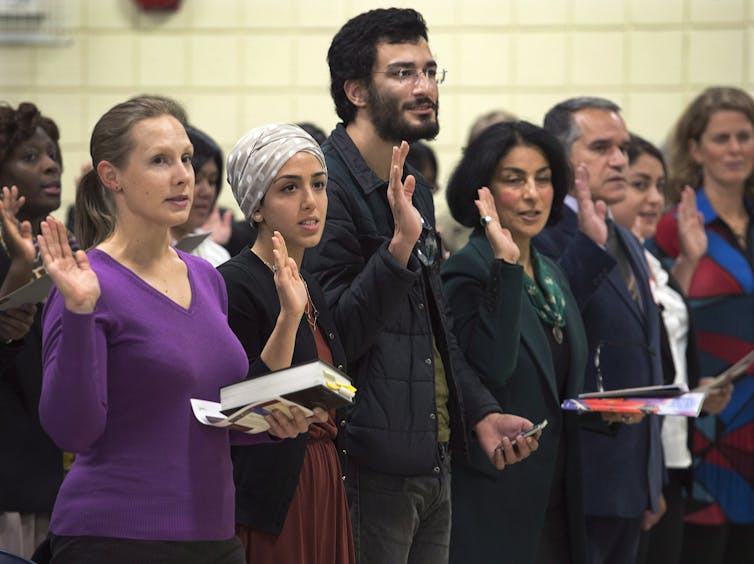In the past few years the world has seen the largest displacements of people since the end of the Second World War. And, according to the World Health Organization, “the scale of anti-migrant sentiment is equally unprecedented.” In Canada, around one in five people were born outside of the country.
How do these experiences of immigration, and of anti-migrant sentiment, impact upon mental health?
This question motivates my research as a PhD candidate in the School of Nursing at the University of British Columbia, where my work has focused on mental health from the perspectives of immigrant and refugee young men in Greater Vancouver.
During my research I interviewed 33 young men (aged from 15 to 22 years) — from various countries and with different immigration backgrounds — about their everyday experiences in relation to their mental health.
My PhD committee and I analysed interview data for narratives that described the experiences of the participants. Three main narratives emerged, those of: Searching for a better life, the pressure of living the immigrant dream and starting again, from way below.
The interviews also revealed experiences of discrimination and of “glass ceilings” in work and career opportunities. One participant attributed some of his frustration to the notion of being a “perpetual foreigner,” which has been linked to lower sense of belonging, lower life satisfaction and greater depression for some groups.
Safety, security, opportunity
The first theme that emerged — of searching for a better life — was linked to safety, security and opportunity. Despite experiences of loss and trauma, particularly for those who were refugees, the participants described a strong sense of hope. For many, the hope for a better life was an impetus for migration.
Canada was often portrayed as “a better country overall” compared to countries from where some of the young men moved. Opportunity was described in terms of employment and freedom to travel. As 19-year old Luke explained, “being on a South African passport, travelling is impossible. [Becoming a Canadian citizen] is really kind of my ticket out of all of that.”

This narrative referred to experiences of navigating global class systems while also reinforcing a view of North American superiority over other countries.
At the same time, the sense of hope for safety, security and opportunity seemed to impact the young men’s mental health in a positive way. For example, some of the participants described their experiences of living through war. Although there was worry about family members “back at home,” they felt safer — and more hopeful — in Canada.
Financial hardship and suicidal thoughts
In the second narrative of living the immigrant dream, interviewees focused on the stress of financial hardship and the pressure this created for the participants to succeed in school.
For 18-year-old Aaron from Bosnia, the pressure to complete school led to several years of suicidal ideation:
I know I’m obligated to [my parents] just ‘cause I feel like I owe them that much at least - so when I do poorly… it really stresses me out and um it kind of just gets all the bad thoughts coming… you just want it to end and how else is it going to end, right?

Here, individual failures were emphasised over the role of systems and institutions to support immigrant and refugee youth.
Discrimination and vulnerability
The third narrative was that of starting again, from way below. Here, the focus was on experiences of discrimination through mainstream views and institutional practices.
As Nabhan, a refugee from Afghanistan, recounted:
My friends were just kind of – “Oh, you guys just wanna –,” like in Afghanistan and Iraq, and Gaza and those places, there was lots of fighting and he was like, “Why you guys don’t want peace in your country?” – I was like, “Well, you can’t just describe the whole country by one or couple people.”
The devaluing of international credentials also came up several times. As 22-year-old Henry from China put it: “It was really hard to find jobs, especially when you were Asian at that time, because… they were more or less really focused on Caucasian people… [and] because [my parents’] credentials from their birthplace weren’t really transferable to here.”
Participants also described their own experiences of discrimination within systems like the schools. Joey (age 16, from China) said:
“I don’t know if I’m supposed to say this but he [the teacher] is nicer to girls in general and he’s nicer to non-Asian, I mean non-Chinese people. Other students told me about this too. But then he’s not the only teacher who does that.”
Experiences of discrimination and racism shaped their mental health and the extent to which they could seek support. Twenty-year-old Hedayat from Bangladesh described it this way:
“For immigrants and people of colour there’s specific emotions that are hard to deal with… anger and pain and things that you’re not really allowed to show in the context of being vulnerable.”
For many of these young men, distress was not allowed — in the context of feeling like “second-class” citizens within Canadian society.
Talking about mental health
Previous research has shown the negative effects of perceived discrimination on mental health. Discrimination can also shape access to mental health supports and the delivery of care.
The findings in my study suggest that social context can make it difficult for immigrant and refugee young men to seek help for mental health challenges.
But some of the men did seek and receive support — from counsellors at their schools and at youth centres. Some described the important role that their youth settlement workers played in helping them adjust to Canadian society and to also deal with difficult experiences. Others turned to their partners, mothers and sisters as people they could trust and talk to.
My research with these immigrant and refugee young men suggests that the accessibility of services and talking about mental health are key.
In Hedayat’s words, “It needs to be okay to seek out these services…there needs to be a bigger dialogue.”
Autrhor:Carla Hilario: Doctoral Candidate in Nursing, University of British Columbia
Credit link:https://theconversation.com/lets-talk-about-the-mental-health-of-young-immigrant-and-refugee-men-90008<imgsrc="https://counter.theconversation.com/content/90008/count.gif?distributor=republish-lightbox-advanced" alt="The Conversation" width="1" height="1" />
The article was first published by The Conversation (http://www.theconversation.com) and is republished with permission granted to www.oasesnews.com

